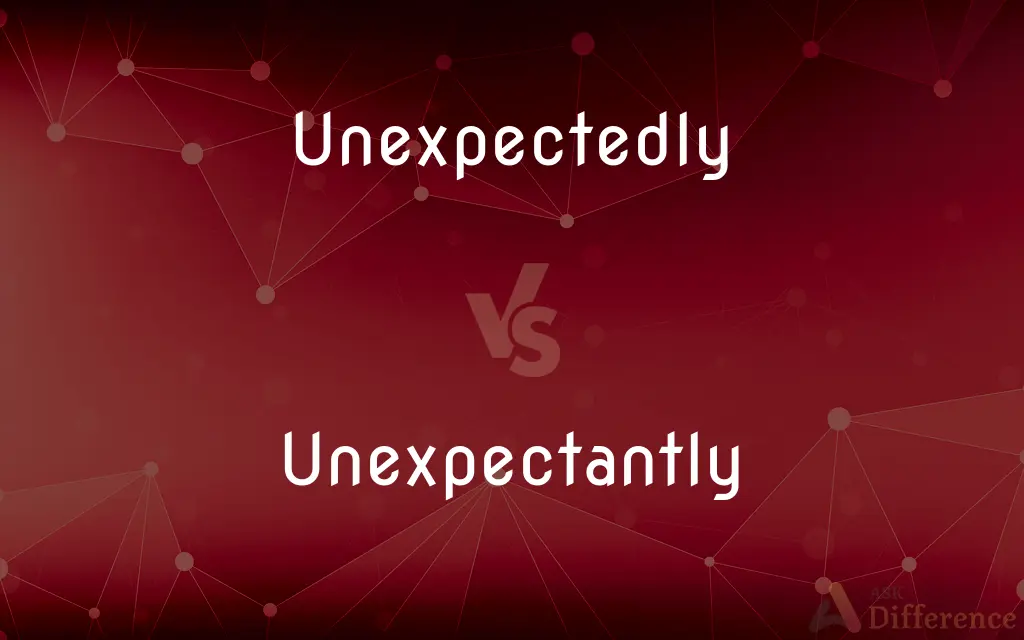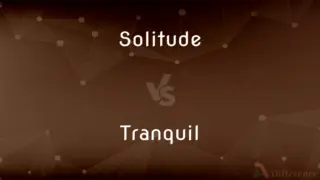Unexpectedly vs. Unexpectantly — What's the Difference?
By Tayyaba Rehman — Updated on November 6, 2023
Unexpectedly means something occurs without warning; "unexpectantly" is a less common and often incorrect variant of the same idea.

Difference Between Unexpectedly and Unexpectantly
Table of Contents
ADVERTISEMENT
Key Differences
"Unexpectedly" is an adverb used to describe an action or event that takes place without anticipation. It implies a surprise or something not foreseen. The word is standard in English and widely accepted in both spoken and written communication, denoting the lack of expectation.
"Unexpectantly" is not recognized as a standard word in English. It is likely a malformation of "unexpectedly" and is rarely used. If it does appear, it is generally considered an error or a nonstandard usage. Some may argue for its use, but it lacks acceptance among English speakers and writers.
When something happens unexpectedly, it catches people off guard. It is a commonly used term in literature, news, and daily conversation. Its correct usage is important for clear communication, ensuring that the unexpected nature of the event is properly conveyed.
Conversely, "unexpectantly" might be used inadvertently when the speaker intends to say "unexpectedly." It’s a result of a misinterpretation of the adverbial form of "unexpected." It should be avoided to maintain proper English.
In essence, "unexpectedly" should always be used when intending to describe something surprising or not anticipated. "Unexpectantly," while it may be understood by some due to its similarity, is not a recognized adverb in English and should be replaced with "unexpectedly" in all instances.
ADVERTISEMENT
Comparison Chart
Standard Usage
Correct and standard usage.
Nonstandard and often incorrect.
Definition
Without forewarning or anticipation.
Erroneous variant of "unexpectedly."
Acceptance
Widely accepted and used.
Rarely used, not widely accepted.
Lexical Recognition
Recognized by dictionaries.
Not recognized by authoritative dictionaries.
Contextual Appropriateness
Appropriate in all contexts requiring the notion of surprise.
Inappropriate in standard English contexts.
Compare with Definitions
Unexpectedly
Without Warning
The storm arrived unexpectedly.
Unexpectantly
Mistakenly Surprisingly
He unexpectantly received a bonus.
Unexpectedly
Suddenly
He unexpectedly burst into laughter.
Unexpectantly
Incorrectly Without Warning
The actor exited the stage unexpectantly.
Unexpectedly
Without Anticipation
The news came unexpectedly.
Unexpectantly
Improperly Abruptly
Silence fell unexpectantly in the midst of the conversation.
Unexpectedly
Abruptly
The peace of the evening was unexpectedly broken by sirens.
Unexpectantly
Nonstandard Without Anticipation
They unexpectantly halted the project.
Unexpectedly
Surprisingly
She unexpectedly won the lottery.
Unexpectantly
Erroneously Suddenly
Unexpectantly, the power went out.
Unexpectedly
Without advance planning;
They met accidentally
Unexpectantly
(proscribed) unexpectedly
Unexpectedly
In a way that was not expected or regarded as likely
Tourist chiefs reported unexpectedly high visitor numbers
He died unexpectedly of a heart attack
Unexpectedly
Occurring without warning; unforeseen.
Unexpectedly
In an unexpected manner.
Unexpectedly
In a way that was not expected;
Her brother showed up at the wedding out of the blue
Common Curiosities
Why do people use unexpectantly?
It’s typically a mistaken form of "unexpectedly."
Can unexpectantly be used in formal writing?
No, "unexpectantly" should not be used; "unexpectedly" is the correct form.
Are unexpectedly and unexpectantly interchangeable?
No, you should always use "unexpectedly."
What does unexpectedly mean?
It means something happens without any warning or anticipation.
Do unexpectedly and unexpectantly have the same meaning?
While intended to have the same meaning, "unexpectantly" is not correct.
Is unexpectantly a word?
No, "unexpectantly" is a nonstandard form and considered incorrect.
How do I use unexpectedly in a sentence?
"The CEO arrived unexpectedly at the meeting."
Where does the word unexpectedly come from?
It comes from the adjective "unexpected," with the adverbial suffix "-ly."
What is the noun form of unexpectedly?
The noun form is "unexpectedness."
Is unexpectedly a negative word?
Not necessarily; it can refer to positive or negative surprises.
Can unexpectedly have a positive connotation?
Yes, such as in "unexpectedly found a friend."
How can I remember not to use unexpectantly?
Remember that "unexpectedly" is the adverbial form of "unexpected."
Is unexpectantly recognized by dictionaries?
No, reputable dictionaries do not recognize it.
What part of speech is unexpectedly?
It is an adverb.
Will using unexpectantly be considered a spelling mistake?
Yes, it is often marked as a spelling error.
Share Your Discovery

Previous Comparison
Solitude vs. Tranquil
Next Comparison
Literary vs. LiteratureAuthor Spotlight
Written by
Tayyaba RehmanTayyaba Rehman is a distinguished writer, currently serving as a primary contributor to askdifference.com. As a researcher in semantics and etymology, Tayyaba's passion for the complexity of languages and their distinctions has found a perfect home on the platform. Tayyaba delves into the intricacies of language, distinguishing between commonly confused words and phrases, thereby providing clarity for readers worldwide.
















































